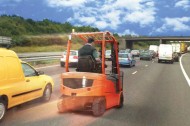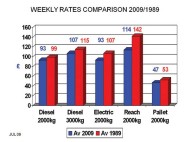 Petrol stations… supermarkets… DIY stores… Garden centres… Prices everywhere continue to rise… Everywhere but the materials handling sector where contract hire rates for fork lift trucks are actually lower now than they were 20 years ago.
Petrol stations… supermarkets… DIY stores… Garden centres… Prices everywhere continue to rise… Everywhere but the materials handling sector where contract hire rates for fork lift trucks are actually lower now than they were 20 years ago.
However, that is a situation that simply cannot be sustained, according to the UK’s foremost independent authority: the Fork Lift Truck Association (FLTA).
Publishing the results of its recent research the FLTA has revealed:
• Average weekly hire prices in 2009 are 17.8 per cent lower than they were in 1989 before adjustments for inflation;
• The weekly hire rate for a reach truck has dropped from £142 to just £114. In real terms, that’s less than half price.
• A 2.0 tonne electric counterbalance truck would have cost £107 per week back in 1989 – or £191 in today’s money. But despite 20 years of economic growth, it now costs just £93 (see chart).
Whilst this might sound great to customers the FLTA is warning that cut-price deals are unrealistically and unsustainably low. This is because the downward pricing trend bears no relation to the exponential rise of costs, including wages and fuel, incurred in running a service support operation.
 The FLTA has voiced its concern that continued heavy discounting may be attractive to potential buyers but has the very real potential to damage the industry’s safety and service standards. In a buyer’s marketplace where the customer is king, it would hardly be surprising if fork lift truck dealers were considering cutting corners simply to keep their businesses afloat.
The FLTA has voiced its concern that continued heavy discounting may be attractive to potential buyers but has the very real potential to damage the industry’s safety and service standards. In a buyer’s marketplace where the customer is king, it would hardly be surprising if fork lift truck dealers were considering cutting corners simply to keep their businesses afloat.
Comparing the fork truck and automotive industries, the FLTA has identified that the industry “norm” for the levels of usage within contract and lease hire arrangements differ massively.
In the fork truck sector it is commonly assumed that 40 hours per week represents a single shift. However this equates to more than 2000 operating hours per year and actually represents intensive usage putting significant strain on truck components and suppliers alike.
By comparison, a similar level of usage in a contract rental car, even at an average speed of just 30 mph would give an annual mileage in excess of 62,000 miles. Such usage would be viewed as extreme, incurring a penalty and requiring a service every two to three months. Indeed it is not uncommon for HGVs to be serviced on a monthly basis.
 The FLTA contends that it is reasonable, therefore, that 40 hours per week should be considered as extended hours for a fork lift truck or even a double shift.
The FLTA contends that it is reasonable, therefore, that 40 hours per week should be considered as extended hours for a fork lift truck or even a double shift.
Moreover, ensuring adequate servicing levels is vital. According to the FLTA the current recession has led some fork lift truck users to cut their level of preventative maintenance by as much as 50 per cent. With fork lift trucks already under strain and given the intensive workload demands placed on them, taking such drastic action could place a customer at risk of falling foul of the law.
Under the Provision and Use of Work Regulations (PUWER 98), a fork lift truck user has a legal duty to ensure that a fork lift truck is always in good repair. The Association advises that, as a minimum, any fork lift truck should be subjected to:
• A sound system of daily or pre-shift checks
• A regular schedule of preventative maintenance which meets the manufacturer’s recommendations and is compatible with useage.
Finding the best deals
Based on its findings the FLTA is advising truck users to get the right contract, not necessarily the cheapest one.
In an unsteady marketplace users need to be alert to the potential pitfalls. If a deal looks too good to be true, it probably is. A significantly reduced price could indicate a significantly reduced level of service provision
and, in turn, leave safety compromised.
For further information about the Fork Lift Truck Association and its activities, visit www.fork-truck.org.uk,
email mail@fork-truck.org.uk, phone 01256 381441




Comments are closed.